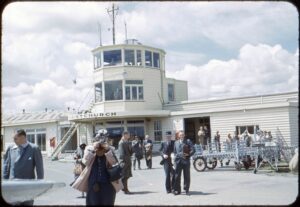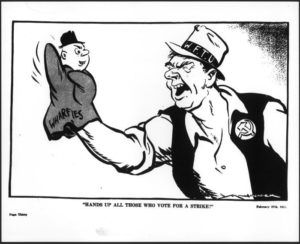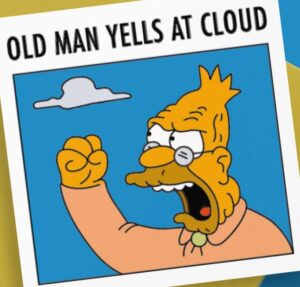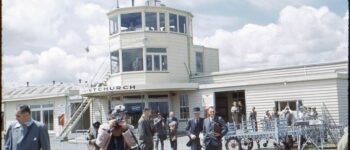1950: Christchurch International Airport
September 2, 2023
By AHNZ

Christchurch Airport became New Zealand’s “first” international airport officially on 18 December, 1950¹.
This was handy timing for Canterbury’s 100th year and the Centennial Games ( 26 December 1950 to 3 January 1951.) The Cantabrians welcomed international athletes. Our very own one-off version of the Olympics or Commonwealth Games and the precursor to the 1974 Olympics Games in Christchurch.
It must have been some help to the project that the Prime Minister at this time was a Christchurch man: Sydney Holland. He had been in the job just 1 year and finally broken the very long streak of the Labour 1.0 Ministry. The former Prime Minister, Peter Fraser, was out and, in fact, had died that very same month (12 December.)
The International Airport was part of a suite of exciting post-war boom projects. New Zealand was feeling her muscles in a prosperous period. Anarchist History of New Zealand refers to this as Golden Weather High (First Turning.)
In the case of Christchurch funding came locally according to (and much to the political theater outrage of) Terry McCombs. Whereas, the new National 1.0 Government fully funded Auckland International Airport, apparently, because, they said, it was of “national importance.” However, Auckland did not get her international airport squared away until 1966.
“The Christchurch international airport at Harewood was dedicated by the Prime Minister, Mr Holland, this afternoon. Big. aircraft, a Constellation from London, a DC6 and a Lincoln bomber of the Royal Australian Air Force arrived during the afternoon. Passengers included the Australian Minister for Air, Mr T. W. White, and a big contingent of athletes for the Centennial Games from Britain, the Continent and Australia.” – Press (1950,) Papers Past
“It is an arrant injustice to the people of Canterbury to ask Christchurch in particular to pay for an international airport when Auckland is to be let off scot-free,” said Mr T. H. McCombs (Opposition, Lyttelton) during his speech in the Budget debate in the House of Representatives to-day. Mr McCombs said the Minister of Works (Mr W. S. Goosman) had stated that Auckland would not have to pay for its international airport, as it was a work of national importance…by an agreement with the Christchurch City Council which, he thought, should not have been made, the council would provide half the cost of the international airport. Christchurch alone would pay..” – Injustice to the People of Canterbury, Press (1950,) Papers Past
“The Harewood Overseas Air Terminal Committee and other South Island interests, which have been pressing their claims for an international airport for nearly two years, cannot be blamed for feeling that the Government is taking an unduly long time to make up its mind.” – Press (1949,) Papers Past
Labour 1.0 certainly was not interested in the International Airport and had been resisting it since 1947. One of their MPs in Christchurch, John Mathison, said “he failed to see the urgency for developing Harewood as an international airport he took a narrow view of the subject.” So did Mathison’s leader, Prime Minister Fraser, who claimed to be waiting for a full report on the matter for years after he already had one.
 National 1.0 appear to have re-written history in a way that has stuck by calling Christchurch’s the nation’s “first” international airport. Auckland’s public airport, then at Whenuapai Airbase, had already been serving as such for some years. It certainly wasn’t as if international planes had never come to New Zealand until some people in Christchurch changed their signage!
National 1.0 appear to have re-written history in a way that has stuck by calling Christchurch’s the nation’s “first” international airport. Auckland’s public airport, then at Whenuapai Airbase, had already been serving as such for some years. It certainly wasn’t as if international planes had never come to New Zealand until some people in Christchurch changed their signage!
My speculation, too, is that Labour 1.0 held back the progress of international air freight because of their close ties to the watersider unionists. Progress to this faster, sky-based, method of moving goods was a threat to union power. The Lefty Unions to which Labour owed great support would be flipping their nut at the idea of having to face a competitive environment for international freight.
As we would see, once again, in February 1951 the watersiders would once again attempt to hold the country to ransom. But they were dealing with National 1.0 now not the friendly Labour Government. Sydney Holland would prove more than a match for the so-called Workers and happily deploy draconian measures to Lock Out the Warfies from the workplace and declare a State of Emergency. Ref. 1951: Lock Out vs Lock Down, AHNZ
 What I’ve never seen anyone mention is this political context for Christchurch International Airport. It must have been that case that Labour 1.0 deliberately put a stop to New Zealand’s progress in the sky. And, that National 1.0 deliberately signed off on the airport and relied upon it as a powerful bit of leverage and means of controlling freight during the time of the great Waterfront Dispute of 1951.
What I’ve never seen anyone mention is this political context for Christchurch International Airport. It must have been that case that Labour 1.0 deliberately put a stop to New Zealand’s progress in the sky. And, that National 1.0 deliberately signed off on the airport and relied upon it as a powerful bit of leverage and means of controlling freight during the time of the great Waterfront Dispute of 1951.
Now I’ve talked myself into this discovery being important I expect I’ll stumble on some sources showing historians have known this for a long time! I can well imagine that Leftys, even in Christchurch, had some hard feelings toward Christchurch Airport as a symbol of the monopolistic disruption and obsolescence to them that it represented. Where once the Unions could make a puppet of the Warfies and hold the country to ransom the now, thanks to this airport in particular, could only shake their empty fist at the clouds at the planes passing over.
Eventually, of course, Labour would abandon its Working Class base entirely in the 1980s and switch to a base representing Victimhood. Ref. 1988: Labour Goes Full Victimhood, AHNZ
Image ref. Dave’s Old Slides, Dave Murray. Rembering Christchurch, Facebook (2023)
Image ref. ‘Hands up all those who vote for a strike’, Minhinnick. New Zealand Herald (1951)
 Like Comment Share
Like Comment Share





